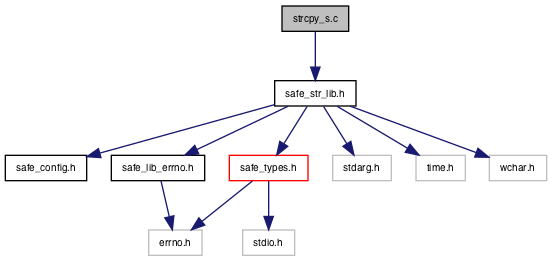strcpy_s.c File Reference
#include "safe_str_lib.h" Include dependency graph for strcpy_s.c:
Include dependency graph for strcpy_s.c:Functions | |
| EXPORT errno_t | strcpy_s (char *restrict dest, rsize_t dmax, const char *restrict src) |
| The strcpy_s function copies the string pointed to by src (including the terminating null character) into the array pointed to by dest. More... | |
Function Documentation
◆ strcpy_s()
| EXPORT errno_t strcpy_s | ( | char *restrict | dest, |
| rsize_t | dmax, | ||
| const char *restrict | src | ||
| ) |
The strcpy_s function copies the string pointed to by src (including the terminating null character) into the array pointed to by dest.
With SAFECLIB_STR_NULL_SLACK defined all elements following the terminating null character (if any) written by strcpy_s in the array of dmax characters pointed to by dest are nulled when strcpy_s returns.
- Remarks
- SPECIFIED IN
- C11 standard (ISO/IEC 9899:2011): K.3.7.1.3 The strcpy_s function (p: 615-616) http://en.cppreference.com/w/c/string/byte/strcpy
- ISO/IEC TR 24731, Programming languages, environments and system software interfaces, Extensions to the C Library, Part I: Bounds-checking interfaces
- Parameters
-
[out] dest pointer to string that will be replaced by src. [in] dmax restricted maximum length of dest [in] src pointer to the string that will be copied to dest
- Precondition
- Neither dest nor src shall be a null pointer.
- dmax shall not be greater than RSIZE_MAX_STR.
- dmax shall not equal zero.
- dmax shall be greater than strnlen_s(src, dmax).
- Copying shall not take place between objects that overlap.
- Note
- C11 uses RSIZE_MAX, not RSIZE_MAX_STR.
- Returns
- If there is a runtime-constraint violation, then if dest is not a null pointer and destmax is greater than zero and not greater than RSIZE_MAX_STR, then strcpy_s nulls dest.
- Return values
-
EOK when successful operation, the characters in src were copied into dest and the result is null terminated. ESNULLP when dest or src is a NULL pointer ESZEROL when dmax = 0 ESLEMAX when dmax > RSIZE_MAX_STR ESOVRLP when strings overlap ESNOSPC when dest < src
- See also
- strcat_s(), strncat_s(), strncpy_s()
